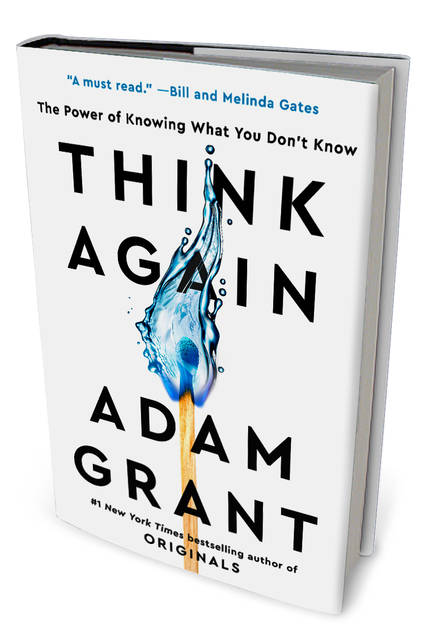
“Changing your mind doesn’t make you a flip-flopper or a hypocrite. It means you were open to learning.” – Adam Grant
For some of us…there is comfort in concrete thinking. That is to say, there is a certain level of security that comes with a solid foundation of beliefs. However, in his book, Think Again: The Power of Knowing What You Don’t Know, Adam Grant challenges the reader to consider letting go of thoughts and ideas that are no longer helpful (and perhaps harmful). That is not to say that there are no facts upon which to build a foundation, but as we grow and learn we may collect new facts that result in different conclusions. However, if we don’t remain open to considering new information and/or positions, we can fall into one or more of three problematic roles that keep us from adapting: The preacher that declares we are right, the prosecutor that attacks those we believe are wrong, and the politician that is just collecting supporters.
The willingness to be flexible in our beliefs and ideas does not need to be perceived as weakness. As the subtitle of the book indicates, there is power in knowing what you don’t know…and great dangers in unwarranted confidence. Grant discusses this when he shares the details of a study by David Dunning and Justin Kruger that has shown that often those that are the least skilled or knowledgeable are the ones that are the most confident. “The first rule of the Dunning-Kruger club is you don’t know you’re a member of the Dunning-Kruger club” – Ig Nobel Laureate David Dunning.
The remainder of the book focuses on the equally valuable concepts of discussing divisive issues and creating communities of lifelong learners. We often discuss the concept of lifelong learning, and many of us spend hours talking about issues with friends, families, neighbors and more. Yet, all too often, we are only prepared to evangelize but not to listen. I find myself wondering, what if we sincerely asked more questions? What if we were prepared to listen… to really listen?
Grant ‘s book offers many cogent points and arguments for our consideration. I came away with asking myself if I was willing to consider other viewpoints. When I read a book, is it to prove my beliefs or to sincerely examine the topic and to learn? Accordingly, here are some of the questions I’m asking myself as I consider (or re-consider) this work:
- Why did I choose this book?
- How often do I find myself in one of the roles described in chapter one (preacher, prosecutor, politician)?
- How tightly do I hold to my thoughts, theories and beliefs?
- Am I protective of my beliefs…to the point of not listening…or thinking?
- How often do I ask myself, “How do I know”?
